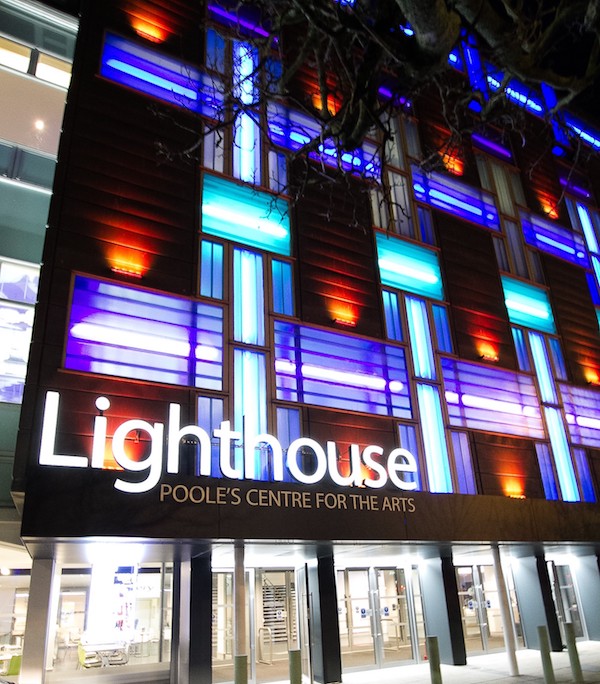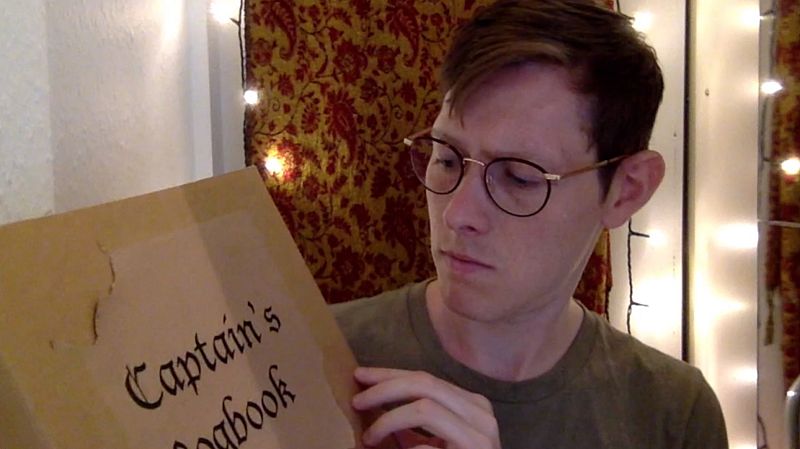19 August 2020
Posted by Jack Thacker

Lighthouse Under Lockdown 2: Tim Colegate
I’m now in the last month of the residency and have begun to reflect on how much has changed for me and for everyone else since this journey began last September. In many ways, this has been a residency of two halves – pre- and post-pandemic.
A more in-depth reflection on the year will follow soon. For now, I need to bring to your attention my involvement in Lighthouse’s bedtime story writing competition. You can hear me reading Ted Hughes’s story ‘How the Polar Bear Became’ here: https://en-gb.facebook.com/lighthousepoole/. I’ve also had the pleasure of reading the shortlist for the competition, the results of which have now come in: https://www.lighthousepoole.co.uk/news/winning-bedtime-stories-to-showcase-online/ You can hear me reading one of the winning entries ‘Saving Bindi’ by Susmita Bhattacharya also here: https://en-gb.facebook.com/lighthousepoole/.
Finally, in the second instillation of a short series of interviews with staff at Lighthouse, I spoke to Tim Colegate, the head of programming at the arts centre, about what has changed for him since the beginning of the pandemic and how he feels about the future of Lighthouse and the arts.
Describe your role at Lighthouse?
I’m the head of programming at Lighthouse, and that entails curating the received programme of work. Lighthouse is a receiving house, which means we don’t produce our own work, we receive it from other producers and promoters. In the simplest terms, my job is to decide which shows we’re going to have, and to follow that process through to deciding on the appropriate pricing, doing the financial deal, and collating all the necessary information to disseminate to the marketing team and the box office team.
How has the role changed as a result of coronavirus?
I was only furloughed for a very short period of time, certainly in comparison to a lot of other people who have been furloughed for months and continue to be. The period immediately before my furlough was taken up with cancellations and rescheduling of shows from our closure period due to the shutdown, which is a big job at any venue but especially at Lighthouse due to the number of events we host.
Upon coming back from furlough, the focus turns towards forward planning and what we can do differently. There’s a bit more of a positive mindset about it now. Instead of looking at what we can’t do, we’re now asking: what can we do? So, what can we move from our studio into the theatre, for example, so we can deliver with social distancing? How can we then use the studio space? Is that where we could support artists to create work with research and development time? It’s made us open our minds about what is possible and how we can deliver what we do differently, or more efficiently, or better. This is by no means an ideal situation for anybody in the arts, but in the interests of trying to find the positives in it - which I am - it’s become an opportunity to revise our sense of what we want Lighthouse to do.
What insights has this period of shutdown given you?
It’s been noticeable in what high regard people hold Lighthouse, and that’s been noticeable by how much it seems to have been missed. However, it’s also made me realise just how frail our industry is. In one sense, I feel that it’s incredibly resilient because the industry has faced cuts for years, and yet we continue, and we still manage to create great work and we still manage to engage people. That being said, although the reaction we are seeing is one of love for Lighthouse, one of missing coming to the theatre and missing that live experience, a large proportion of our audience are understandably feeling uneasy about coming back. Every theatre manager, every producer, wants a sold-out show, so this is a really weird inversion of the normal thought process, whereby the priority is to have fewer people in the building, and that really limits what we can do.
What are your thoughts on the future of the performing arts in the UK?
There’s a big drive at the moment for ensuring that venues and organisations, such as Lighthouse, support individual artists, most of whom are freelance and have had a really tough past few months. I think that’s absolutely right, and we should be looking to do that. However, our first priority is for us to safeguard Lighthouse and ensure that Lighthouse continues to operate well into the future and delivers artistic output and engages our community. We can’t do that if we’re not here.
As wonderful as it has been to see the digital output that has been happening over the course of lockdown, there’s a reason why people love coming to the theatre and going to gigs. It’s the live experience that people crave and that’s what they’re missing.
Which artist or artwork in any medium has helped you through this period?
I’ve listened to quite a lot of music while I’ve been working from home. I’ve been discovering some bands that have been getting me through the working day. I’ve listened to a lot of Billy Joel, for instance. I have my piano here as well. I’m not classically trained or anything – I just jam about really. So, listening to those piano-led artists has meant that I’ve been trying to make a conscious effort to play more.
Here I am reading 'Saving Bindi' by Susmita Bhattacharya

Archive
Junior & Young Writers Week 3: Return From The Magical World
Junior & Young Writers Week 2: African Mythology
Problems, Problems, Problems...
Cautionary Tales & Christmassy Opening Lines
You've Gotta Have Pace, Pace, Pace
Junior & Young Writers Week 1: Alien Encounters
Junior & Young Writers: Week 5 - Play on Words Pt. 2
Junior & Young Writers: Week 11 - end of term showcase [build a bard workshop]
Junior & Young Writers: Week 10 - Greek Theatre - chorus stories
Junior & Young Writers: Week 9 - Greek Origin Stories - Spring
Rubber Ducks & Writing Festivals
Junior & Young Writers: Week 7 - Greek Hero Stories [the 12 labours of Hercules]
Junior & Young Writers: Week 12 [Wild Words] - Stuff & Things
Junior & Young Writers: Week 11 [Wild Words] - World Building 2
Junior & Young Writers: Week 10 [Wild Words] - World Building
Junior & Young Writers: Week 9 [Wild Words] - Mystery & Choose Your Own Adventure
Junior & Young Writers: Week 8 [Wild Words] - Spooky Sequels & Potion Poems
Junior & Young Writers – Week 10 (Writers’ Inspiration) – Final Showcase
Junior & Young Writers – Week 9 (Writers’ Inspiration) – Editing & Performance Tips
Junior & Young Writers – Week 8 (Writers’ Inspiration) – Cuteness
Time goes on by Tavinder Kaur New
Junior & Young Writers – Week 7 (Writers’ Inspiration) – Natural Solutions
Junior & Young Writers – Week 6 (Writers’ Inspiration) – The Language of Fruit and Veg
Junior & Young Writers – Week 5 (Writers’ Inspiration) – Adventures In Space
Tinklebobs and Bedraggled Angles
Junior & Young Writers – Week 4 (Writers’ Inspiration) – Our Environment
Fortune Tellers & Future Letters
Junior & Young Writers – Week 3 (Writers’ Inspiration) – Home
Young Writers - Week 10 (The Art of Writing) – Final Week Showcase
Junior Writers - Week 10 (The Art of Writing) – Final Week Showcase
Young Writers – Week 9 (The Art of Writing) – Choose Your Own Adventure
Junior Writers – Week 9 (The Art of Writing) – Choose Your Own Adventure
Young Writers – Week 8 (The Art of Writing) – Sequel Stories
Junior Writers – Week 8 (The Art of Writing) – Sequel Stories
Young Writers – Week 7 (The Art of Writing) – Picture Prompts
Junior Writers – Week 7 (The Art of Writing) – Picture Prompts
Young Writers - Week 6 (The Art of Writing) - Script-writing & Dialogue
Junior Writers - Week 6 (The Art of Writing) - Script-writing & Dialogue
Junior Writers – Week 5 (The Art of Writing) – Poetry
Young Writers - Week 5 (The Art of Writing) - Poetry Potions
Edward The Martyr - A Competition!
Mood Boards and Postcards from Space
Young Writers - Week 3 (The Art of Writing) - PLOT
Junior Writers - Week 3 (The Art of Writing) - PLOT
Moomin Stories and Hollywood Pitches
Young Writers - Week 2 (The Art of Writing) - Genre & Setting
Junior Writers - Week 2 (The Art of Writing) - Genre & Setting
Prompts, Dialogues, and Cliché
Story Structure Part One: Exposition and Beyond...
Young Writers - Week 1 (The Art of Writing) - Character
Junior Writers - Week 1 (The Art of Writing) - Character
Young Writers - week 4 - Nature Writing [animals & wildlife]
Junior Writers - week 4 - Nature Writing [animals & wildlife]
Young Writers - week 3 - Nature Writing [trees/plants/flowers]
Junior Writers - week 3 - Nature Writing [trees/plants/flowers]
Young Writers - week 2 - 'fractured fairy tales'
Junior Writers - week 2 - 'fractured fairy tales'
Young Writers - week 1 - 'from deep inside a forest'
Creating Communities through Writing
WORDCUP - Hounsdown Session #6
Making pillows in a house full of feathers
WORDCUP - Hounsdown Session #5
Exploring home – a place, person, house
WORDCUP - Hounsdown Session #4
Stories From Our Streets at the Abbeyfield Wessex Society Reminiscence Session at Poole Library
What Do You Really Mean? Writing Dialogue for Scripts
WORDCUP - Hounsdown Session #3
Character Building & Murder Mysteries
Going inside – from a spark to a story
WORDCUP - Hounsdown Session #2
Maybe I Can Be Invisible After All... Monologues
Creative Writing: Fun Facts, Diverse Voices and Different Perspectives
Writing Competition - Stories From Our Streets
Stories From Our Streets Community Activity Pack
Thinking in-quiet, after the fire
Found Cities, Lost Objects: Women in the City Curated by Lubaina Himid CBE
Ekphrastic Jukebox - Writing to Music
ArtfulScribe LitFest Community Showcase 2023
Young writers exercise their creative power
Writing to The Sorcerer's Apprentice
The Mousetrap - Mayflower Young and Junior Writers Investigate Mystery!
Stories From Our Streets Launch!
Interview: In Conversation with Dr Victoria Leslie
The Missing Farmer/ Blackout Poetry & DADA
Exploring this wonderful World
Using props to create characters/ working as a writing room
Stories of the Dust and Character Questions
Storytelling and Escalation or Rising Action
Junior Writers Club Acrostic Poem
Notes on Intention for MAST Collective - Year 3 - Facilitation Focus
Earthquakes & Dominoes - MAST Collective Blog #4
SUPER MARIO AND POP CULTURE POEMS
Receptionists & Inky Voids - MAST Collective Blog #3
Saying No and saying YES on National Poetry Day!
There's a Dragon in the Wardrobe...
House Warming Party (The Mortifying Ordeal of Being Known) - MAST Collective Blog #2
Intern Blog 5 - The Publishing Process
POEMS TO SOLVE THE CLIMATE CRISIS
On The Streets With Theresa Lola
Intern Blog 4 - The Internship Journey
NEW DIRECTIONS, STARTING SMALL - THE ORWELL YOUTH PRIZE
LIGHTHOUSES, HOPE AND METAPHORS
on workshop and transformations: frogs, lions, and the duck that becomes a larder...
Poetry Ambassadors - Interview with April Egan
Intern Blog 1 - Finding a Voice
World Poetry Day: Fluffypunk and the Invisible Women
On Being a Writer: A Conversation by Beth Phillips & Sam Morton
Poetry Ambassadors - Interview with Kaycee Hill
UNHEARD VOICES: INTERNATIONAL WOMEN'S DAY, AND STORIES OF CONFLICT













